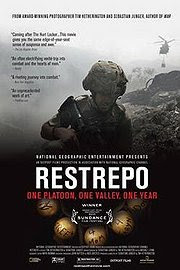Restrepo, a documentary directed by American journalist Sebastian Junger and British photographer Tim Hetherington,
is one of the grittiest portrayals of war ever created. Working on assignment for
Vanity Fair, the two men spent fifteen months in Afghanistan during 2007 and 2008, stationed for the entirety with 2nd Platoon, who are assigned to protect the Korengal Valley. During that time they captured over 150 hours of footage, which is carefully constructed into this powerful journey into Hell. This valley has been the cause of many casualties for the U.S Army and regarded as one of the most dangerous places in the world, with the expectation of enemy contact every day. The 2nd Platoon, under the command of Capt. Dan Kearney are assigned to the Valley with the hope of turning the tide in favor of the United States by building an outpost which would give them a prominent vantage point within the valley and be able to impede the Taliban supply lines. The outpost is named
OP Restrepo after one of the Platoon's doctors, who had been killed before filming started. The film opens with some grainy footage of members of the platoon messing around with a camera. One of these men is Restrepo who enthusiastically reveals that he is excited to be representing his country with such great mates. In his honor, his buddies name the outpost, which was built under consistent enemy contact, after him. The film brilliantly weaves together the shocking footage of the platoons deployment in the Korengal, their struggle to build
OP Restrepo and regain control over the valley, with a series of interviews that provide the honest and emotional recounts of some of the men after they have been discharged from service and have returned home.
Throughout
Restrepo, war is never romaticized or glorified at all. It is a raw, horrifying, affecting and inspiring portrayal of the extraordinary bravery of these men, and the work they did for their country. Just as extraordinary is the work of Junger and Hetherington, who, throughout each firefight with the often unseen enemy, are scaling the mountainous terrain and finding cover alongside the armed troops they are filming. This is an example of pure reporting, never forming a state of bias, but just showing it how it is and perfectly encapsulating the fears and frustrations of these men. No sequences are more heartbreaking than when the men are forced to stop in the middle of an attack to grieve the death of one of their comrades. Too overcome with emotion to continue, they cease their advance and weep. It never chooses to explain or attack the war, but merely serves as a depiction of the struggles of the American soldiers and places us in as privileged a position as possible to feel as the soldiers did. But of course, there would be no substitute for the feeling of actually being shot at. A very important film,
Restrepo is a moving and visceral experience.
My Rating: 4 Stars

No comments:
Post a Comment